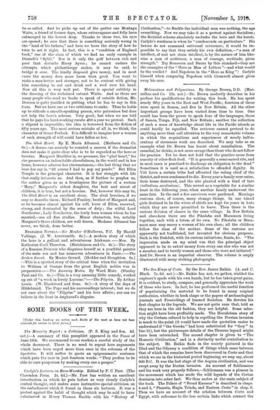Melanesians and Polynesians. By George Brown, D.D. (Mac- millan and
Co. 12s. net.)—Dr. Brown modestly describes in his preface his qualifications for writing this book. He has spent nearly fifty years in the East and West Pacific; fourteen of these were spent in Samoa, and five in New Britain. All the other important groups have been visited from time to time. One result has been the power to speak four of the languages, those of Samoa, Tonga, Fiji, and New Britain ; another the collection of such a mass of knowledge about life in the Pacific islands as could hardly be equalled. The reviewer cannot pretend to do anything more than call attention to the very remarkable volume in which the acquisitions and experiences of nearly half-a- century of strenuous work are described. We may take as an example what Dr. Brown has learnt about cannibalism. The cannibal, he thinks, is not more savage than those who do not follow the practice. Yet he does not hold that the practice arose from scarcity of other flesh food. "It is generally a semi-sacred rite, and in most cases is practised to discharge an obligation to the dead." Sometimes it is used as . a satisfaction to offended dignity. In Viti Levu a certain tribe had affronted the ruling chief of the district, and were condemned to die. Every year a family were eaten, their home destroyed, and the site planted with a kind of tare (calladium esculentum). This served as a vegetable for a similar feast in the following year, when another family underwent the same fate. In the end a few survivors were pardoned. Marriage customs show, of course, many strange things. In one island girls destined to be the wives of chiefs are kept for years in huts which they are never permitted to leave. Then there is the curious division of classes in the same village. In New Britain and elsewhere there are the Pikalaba and Maramara living together, each with a totem of its own. No Pikalaba or Mara- mare man may marry a woman of his own class; all the children follow the class of the mother. Some of the customs are apparently not traditional, but invented for obvious purposes. Such is the Dukdnk, with its curious initiations, feasts, &c. "The impression made on my mind was that the principal object appeared to be to extort money from every one else who was not a member, and to terrify women and those who were not initiated." And Dr. Brown is an impartial observer. The volume is amply illustrated with many striking photographs.


































































 Previous page
Previous page